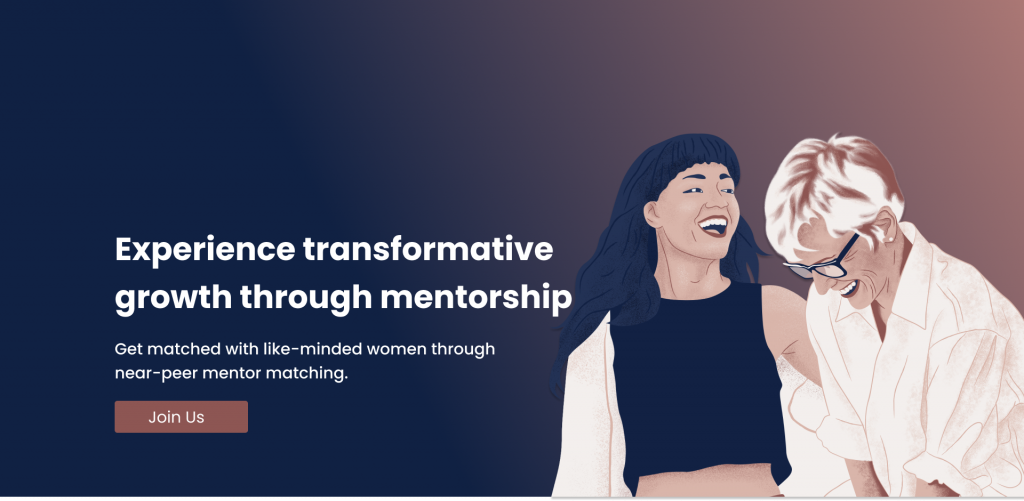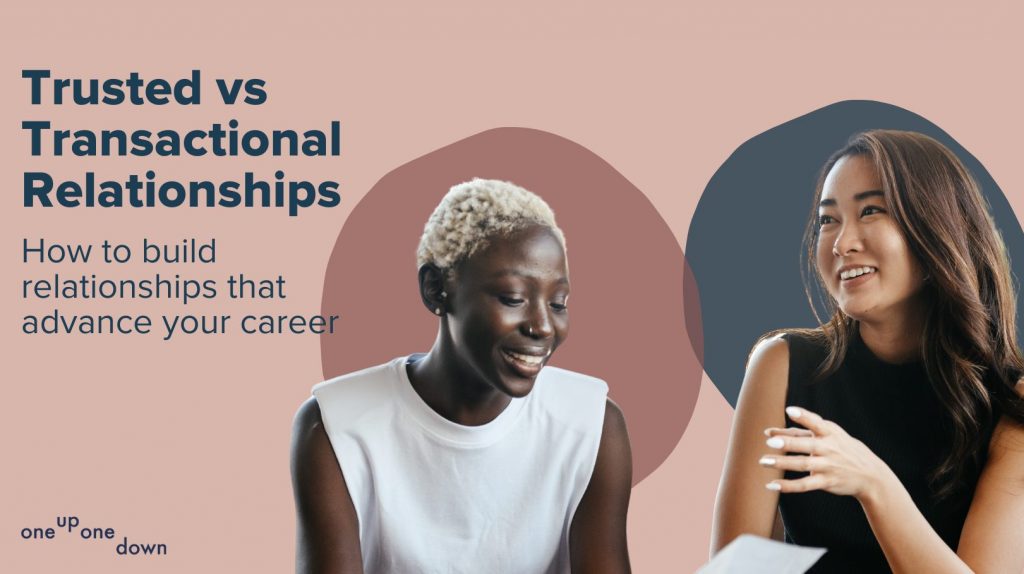How well you perform in your career hinges on more than just your technical skill. You can tick all the boxes, complete your tasks to a T, and still find yourself struggling to advance, gain confidence, and step into your full potential. This becomes more apparent as people start to move from operational to leadership roles.
Success doesn’t come from technical capability alone – it comes from a mindset that allows you to grow. In this blog, we’re going to talk about a mindset that might be impacting your ability to build relationships with others. The key is learning how to build trusting and collaborative relationships, as opposed to transactional and competitive ones.
When you step from a competitive into a collaborative mindset and turn transactional interactions into trusting relationships, your approach to colleagues, clients, customers, and service providers changes. The benefits of this shift are huge.
Natalie Robinson, CEO of OneUpOneDown explains: “Trusting relationships enable us to connect, learn from one another, give and take direction, and get to the root of what needs to be done. It’s what organizations are all about – working together to create something of value. On a grand scale or on a small scale, it’s about your ability to work together with people.”
Yet many people hold themselves back because they fear or do not know how to build relationships, and in doing so they are not able to have the impact, influence and fulfilment they are capable of.
OneUpOneDown aims to empower women to step into their full potential in their careers, so we spoke to Natalie about her own journey and what she’s learned about understanding and overcoming these fears.
If you’ve been struggling to progress or find fulfilment in your career, this is the guide you must read today.
Identify a transactional vs trusting relationship
Your ability to succeed as an employee – and on a macro scale as an organization – comes down to your relationships: how well you can understand, build trust, and influence people. Whether you’re climbing the ladder, building your own business, or managing a team, your relationships will determine your success.
Before we get into the underlying mindsets, let’s take a look at what we see on the surface: transactional vs trusting relationships.
These are two ends of a spectrum, and you’ve probably already seen them in action:
- Transactional relationships
I’m here to do a job. We’ll talk about what I need to talk about to get the job done, but there’ll be little interaction outside of that.
- Trusting relationships
I’m interested to learn about you and your experiences. I value the relationship and am open to allowing it to strengthen by sharing information that is not only related to the task at hand.
Natalie explains, “By building relationships we’re creating pathways for information to flow, and opportunities to arise. When two people are operating in a transactional relationship only the bare minimum of information can pass. But when a trusting relationship is born a greater depth of knowledge can flow between them, the interactions will be more meaningful and multi-dimensional, and we’ll be able to get through challenges much more easily.”
We’ve all met people who are uninspired in their work and don’t put in any effort to belong. They get in, they get out, they get paid, and that’s that. Sometimes it’s intentional.
But other times people can act this way by simply not knowing how else to operate – how do you begin to build relationships? How do you get over your fears?
“In my first corporate job, I was terrified of talking to a customer on the phone,” describes Natalie, “I was afraid I wasn’t good enough to take calls, make sales, or talk to customers at all. I wasn’t comfortable building relationships because of this fear – I was trapped in a purely transactional state, where I was focused only on delivering the task without any room for being myself and learning about the other person on the other end of the transaction.”
Transform your mindset from competitive to collaborative
So how can we make this shift from transactional to trusting relationships? To feel authentic and remain true to yourself, the change needs to be more than skin deep.
You’re probably not aware of it, but we typically frame our relationships in two ways: competitive or collaborative. Our education and society tend to tip us toward the competitive side:
“In school, we’re taught competition – you’re ranked based on your test results, taught to compete to get ahead, and rewarded for doing better than your peers (or disciplined for not doing well enough). Many workplaces are much the same – you’re competing for a promotion or to get a project, you’re competing to move up in the hierarchy, to get noticed by the boss, to win over others.”
Competition isn’t bad in and of itself, but it’s when that attitude creeps into our relationships that we start to feel its negative impacts. There’s a time and a place for being competitive, for embracing rivalry for motivation and growth, but relationships don’t thrive under comparison, and neither does your self-esteem.
“When you’re trapped in a competitive or comparative mindset, you’re perception of your own value is derived by comparing yourself to others. You might be thinking that you’re not good enough because of how you see yourself relative to someone else, or you might feel good about yourself because you outperformed someone else.”
A competitive or comparative mindset can be identified by reflecting on whether you’re assessing your performance by comparing yourself to someone else or assessing yourself relative to the goal at hand. Are you open and happy for your peers when they succeed, or does it upset you in some way?
The alternative framing is collaboration – I win, you win, and we both get the best outcome. This mindset is centred on trust and openness, an eagerness to learn, share and work together to reach the desired outcome. Instead of an individualistic focus on getting ahead, your goal is to find solutions together using the strengths that each person can bring.
“You don’t have to lose your ambition to grow, but your approach shifts to be more about the relationships you build and less about winning (or being right) at the cost of all else.”
This frees you to share information and ideas more readily, bring more to the table, and get more back. It really is a win-win for everyone involved and creates value that’s more than the sum of its parts.
Get practice through being a mentor
A mindset shift doesn’t happen by just reading a blog or writing out affirmations – it takes person-to-person practice to get comfortable with and internalize this new way of being.
Natalie recommends becoming a mentor for the opportunity to practice without the pressure: “We often see mentors who are worried that they’re not good enough to show up and add value to the session, or even be a mentor in the first place. They’re worried that they’re not good enough relative to the other person, whoever this might be in their mind. I believe people feel this way because they are comparing themselves to an idea of what a mentor should be. Mentorship is an opportunity as a way to work with someone else (the mentee) to both improve and move towards the desired outcome. It is a collaboration. The mentor is not expected to have all the answers.”
Through being a mentor you can become better at holding space, letting conversation happen, and relationships to form. Your role is to observe, listen, and ask questions – it is a practice of collaboration, there’s no space for competition or transaction.
“Mentorship requires you to reflect on your own value and bring that to the conversation by sharing your experiences,” explains Natalie, “Most people notice a difference after their first match, around three months in. We often get feedback from first-time mentors who hadn’t considered how much they’d get out of it – they thought they were giving back but didn’t realize what they’d get in return. They’re more confident, they’re finding it easier to communicate, they’re more relaxed when building relationships at work.”
With each mentoring match through OneUpOneDown, you’re paired with someone a couple of steps behind you meaning you already have what you need to help this person – all it takes is some confidence in yourself.

Change your mindset to open up new paths
Shifting your mindset is an ongoing practice, like developing muscles through strength training or calming the mind through meditation. It gets easier the more you practice, and becomes second nature over time.
And, like working out or meditation, the best way to see results is to start.
At OneUpOneDown, our mission is to make great matches and help mentees and mentors develop their skills so they can step into their full potential in the workplace.
We’ll supply you with guides and supporting materials including step-by-step ways to make mentoring easy. From there, all you need to do is do it – let go of any idea that you might not be good enough, open yourself up to collaboration, become aware of purely transactional relationships and shift them into trusting connections.
This change will help you find fulfilment in your work, maximize your value, and grow your career to its full potential. Our strong community of OneUpOneDown women are here by your side – when you’re ready to start, we’re here to help.
Follow OneUpOneDown on Facebook, LinkedIn, Twitter and Instagram to stay tuned with the latest news.
